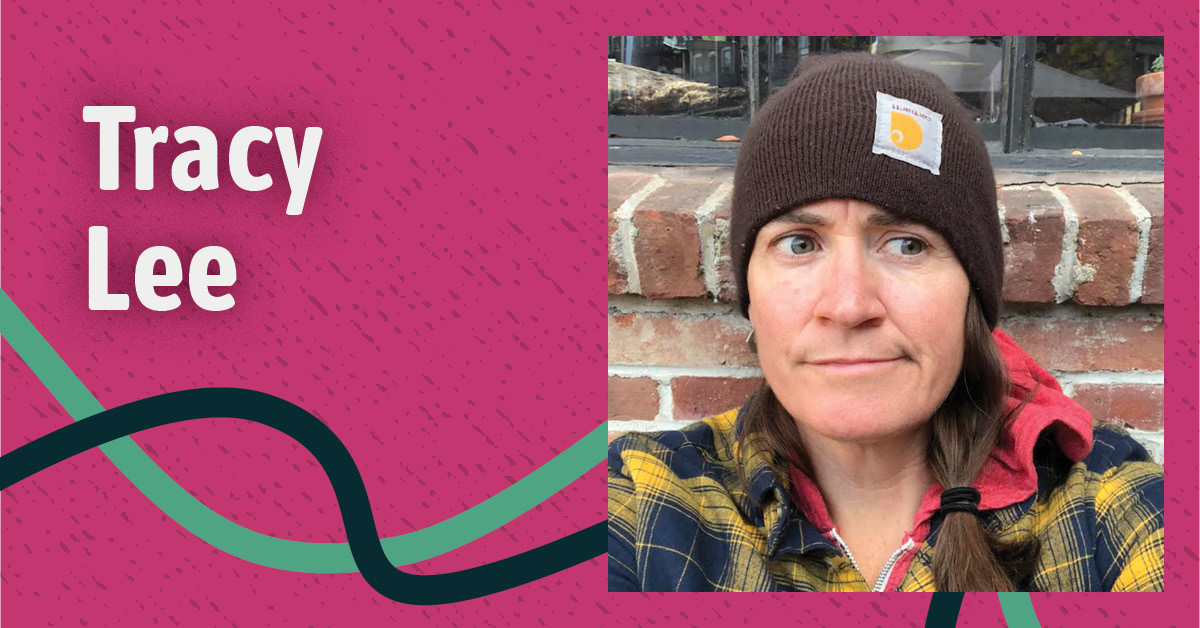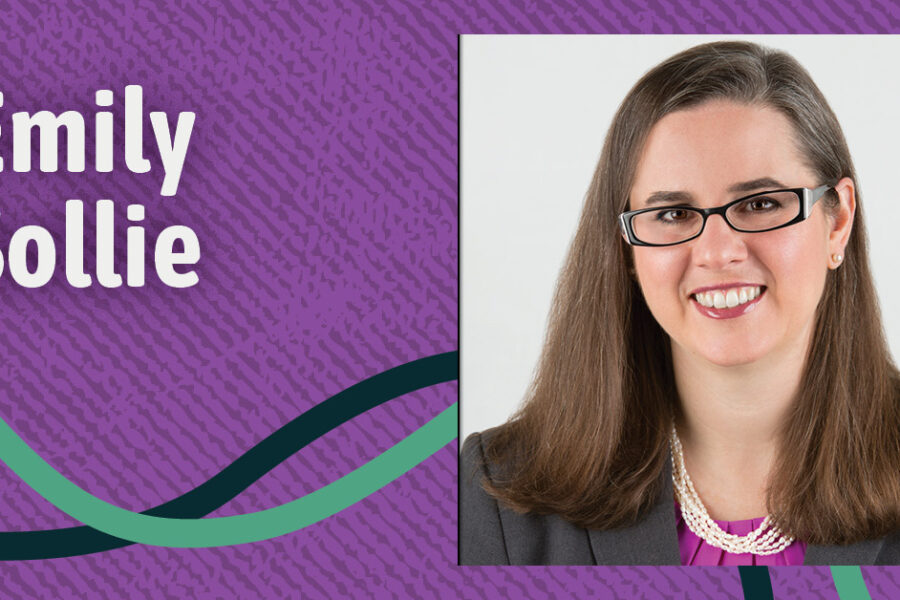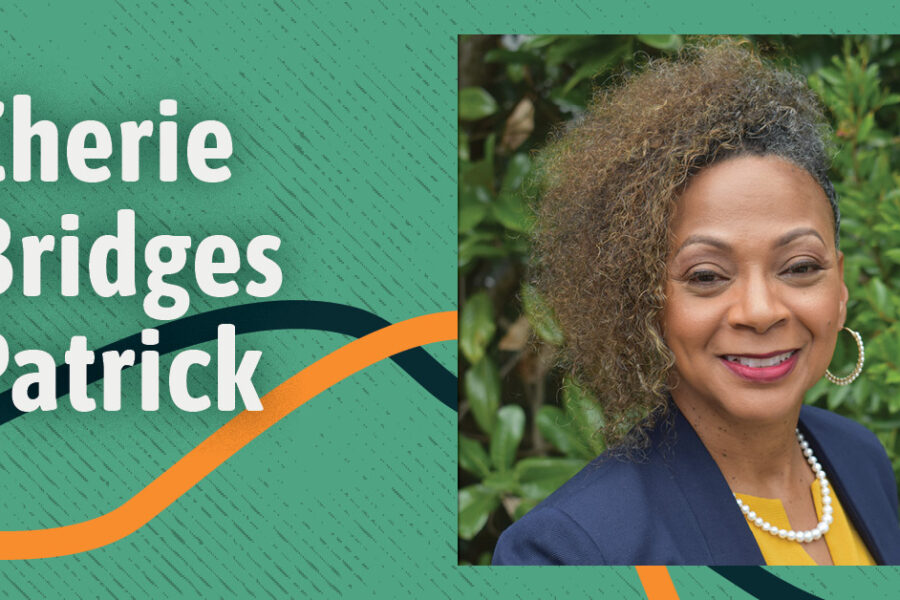“I have this vision of a different, more alternative way of healing that’s not just sitting in blank, stale rooms,” says Tracy Lee. “I want to move people outdoors and into nature, to use creative healing approaches, creative therapy, and ecotherapy for change.”
These dreams are personal for Tracy Lee—in her own life, it was creativity and spirituality that helped guide her away from the cycles of addiction. But it’s also professional, because today she is in the early stages of a career as a counselor, helping others to heal—in both traditional and innovative ways—from issues related to substance use and addiction.
Tracy Lee is currently pursuing these goals through studies in the Master of Arts in Clinical Mental Health Counseling at Antioch New England. She is also the first recipient of the Scott Herterich Memorial Scholarship, an award available for students in that program who are pursuing a concentration in Addictions Counseling. I recently spoke with her over Zoom to learn more about what brought her to the program, what the history of the award is, and where she plans to bring her work in the future.
A Choice to Serve Others
Tracy Lee grew up in Greenfield, Massachusetts and obtained an undergraduate degree in film, video, and new media from The School of The Art Institute of Chicago. She has significant experience as a graphic designer, but it was a different background that would lead to her eventual career: her own struggles with degrees of addiction that run deep through her family of origin. As she worked hard in her move towards recovery, a journey that led to personal healing and growth, she became motivated to work with others who struggle with similar experiences and decided the best way to do this was to become a counselor.
This decision was also driven by another part of Tracy Lee’s identity: being a member of the LGBTQ+ community. Tracy Lee identifies as non-binary, choosing she or they pronouns, and in her experience counselors aren’t always good at supporting people who are gender-nonconforming. This gave her the desire to contribute to an increased representation in the field.
“I couldn’t find a lot of therapists who specialize in issues related to substance use and addiction who are also members of the LGBTQIA+ community and work to support underserved populations,” says Tracy Lee. From this lack of representation grew a desire to help others while also promoting diversity.
The Draw to Study at Antioch
Tracy Lee decided to pursue a career in therapy, and after some research she enrolled in the Master of Arts in Clinical Mental Health Counseling at Antioch New England. She had long known about this program—Antioch holds a particular appeal for people in the New England area, she explains, and is a popular choice for those interested in pursuing careers in clinical mental health. (For instance, her own therapist is an alum.) She was also drawn to Antioch’s accreditation with the Council for Accreditation of Counseling & Related Educational Programs—a notable accreditation that ensures compliance with widely recognized standards.
Tracy Lee began her program at Antioch in January 2020—right before the COVID-19 pandemic. Soon all of her classes were being held mostly online, which wasn’t at all what she expected. However, she found that the online convenience of her studies worked well for her. Having been out of college for some time and being an introvert, she found it was easier to focus on studies alone and in quiet spaces.
Nevertheless, it was important to Tracy Lee that she get to know her classmates—and this ended up working out just fine in the online format. “I really like being a part of a cohort,” she says. “I really like meeting new people who came in at the same time I did, or around that time, and were also a little bit lost.” The intimacy and connection of sharing so many classes and discussions and projects, Tracy Lee says, makes her feel that she will “come out of this with some hopefully long-term friendships.”
She also really appreciates how her own mission combines with Antioch’s mission to “empower students to lead meaningful lives and to advance social, economic, and environmental justice.” This directly correlates to Tracy Lee’s professional aspirations. “I hope to advocate for and be more actively involved in opening doors for minority groups and those of us who are underserved,” says Tracy Lee. She wants to make an impact by helping those who for whatever reason are having trouble accessing resources to be able to receive the help they need.
Today, Tracy Lee is in her last semester of academic work, and she is employed as a Recovery Coach at a local nonprofit, the Center for Human Development. After this semester, she will begin internships, which most likely will be carried out at another nonprofit organization similar to where she is currently employed. She plans for these internships to be concentrated in the area of issues related to substance use and addiction counseling.
A Scholarship With A Personal Resonance
Tracy Lee is already making a difference in the lives of others through her work as a Recovery Coach. In this position, she’s able to share her own lived experience finding support for personal issues related to substance use and addiction with others who are navigating the system. By doing this, she helps provide basic needs to a vulnerable population, needs that many sometimes take for granted, such as transportation, picking up prescriptions, getting to meetings, and staying motivated. She supports her clients through the hard process of transitioning from substance use to carefully putting their lives back together without drugs and alcohol.
She also spends time helping clients stay on track, advocate for themselves, and work to identify actions that they can take towards practicing harm reduction. This addiction treatment philosophy says that rather than emphasize quitting “cold turkey” there are other steps individuals and organizations can take to reduce the negative personal and public health impacts of behavior associated with substance use.
This work, and her own life story, inspired her to apply for Antioch’s Scott Herterich Memorial Scholarship. Herterich was a beloved member of the CMHC class of 2019 who was well known on campus for his compassion and brilliance. He often spoke about spending time in Peru working at an orphanage. His motivation to become a counselor, like Tracy Lee, was inspired by his own recovery journey.
In 2018, Herterich died as a result of an overdose, devastating his community. The Scott Herterich Memorial Scholarship was established in his memory to reduce the stigma of addiction and support others pursuing a similar career.
It was an ideal match considering her program, concentration, and the ever-present financial need that most students face. And it’s made a difference in her life and studies. Tracy Lee says that she felt great when she was notified that she was the inaugural recipient.
Creativity as a Healer
Tracy Lee is on track to making a significant impact in the lives of others struggling with addiction and overcoming issues related to substance use, but she also makes time to care for herself—often in creative ways.
Her biggest creative endeavor of the last few years has been building a space that she can live in. “I’m actually building my own house!” she says. “I’ve taken over this 1000-square-foot space behind my mother’s home in this little neighborhood, and I’m just kind of doing it all myself.”
Tracy Lee also recently started a small business providing do-it-yourself assistance to the LGBTQIA+ community in western Massachusetts. Called Handiqueers.com, it offers supportive help with moving, hauling, landscaping, gardening, odd jobs, general labor, and small household repairs. Tracy Lee started the business because she feels that members of this population deserve to feel comfortable with the service providers who enter their homes.
She is also finding time to work with film, video, photography, and graphic design—her passions, which used to be her career. Having shifted her academic studies from visual art to mental health has actually given her more freedom to pursue her interests and experiences in art.
Tracy Lee enjoys many eclectic forms of art, but she has other creative outlets too. For six years she helped run a school for herbal medicine, The Gaia School of Healing in Putney, Vermont. “I was living in Vermont with my partner and learned a lot about plant spirit medicine and gardening, and that’s where I fell in love with plants.” Tracy Lee says, “I love the Earth, the woods, and everything that involves nature. I believe this is where the real healing happens. All of these things feed my soul and creativity.”
Art was also a vehicle for healing in her recovery journey. Learning the art of stained glass helped her redirect her energies. She explains that instead of using substances, she switched her action to creating something new.
Today, her interests are coming into alignment. She is creating spaces and solidarity, along with professional competence, to help others with their own unique journeys to recovery.




